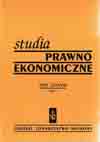Wymogi formalne testamentu tajemnego w świetle ustawodawstwa Królestwa Polskiego i praktyki na przykładzie akt kancelarii notarialnych w Zgierzu
Formal requirements for the mystic will on the basis of the legislation of the Kingdom of Poland in view of the records of the notary offices in
Author(s): Dorota Wiśniewska-Jóźwiak, Justyna BiedaSubject(s): Law, Constitution, Jurisprudence
Published by: Łódzkie Towarzystwo Naukowe
Summary/Abstract: The secret (mystic) will, along with a self-written (holographic) will and a public will, was authorised by the Napoleonic Code. It contained some of the characteristics of a holographic will, since its details were kept secret, and a public will, since it had force of evidence of a legal instrument. It consisted of two parts: a private document containing the declaration of will and a legal document that is legal overwriting added by the notary. Legally binding requirements were defined by the Napoleonic Code and no derogation was ever permitted. They were peremptory norms (lat. ius cogens). The legal overwriting added by the notary was regulated not only by the Napoleonic Code, but also by the French law from 1803 (Law Ventôse An XI of the 17 March 1803). Some of the requirements included in the French law from 1803 (Law Ventôse An XI of the 17 March 1803) were considered rules capable of being modified by contrary contractual engagements (lat. ius dispositivum), which means that not following them had consequences other than validity problems. Some of the possible consequences were fees for the notary, an obligation to make up for the detriment of the improperly prepared document, the problems with validity of some fragments of the document or suspension of the notary. In the State Archive in Łódź there are only nine secret wills gathered in the records of the notary offices in Zgierz in 1826–1875. Seven of them contain legal overwriting added by the notary and five decrees remain sealed. There are also two pieces of information claiming that two more decrees were of mystic form, but the documents themselves were not preserved. Even though there are so few examples of notary’s practice in the field of a mystic will, the article traces the legal requirements for the composition of such a document and the conclusions that can be drawn on the basis of them.
Journal: Studia Prawno-Ekonomiczne
- Issue Year: 2013
- Issue No: 88
- Page Range: 11-34
- Page Count: 24
- Language: Polish

